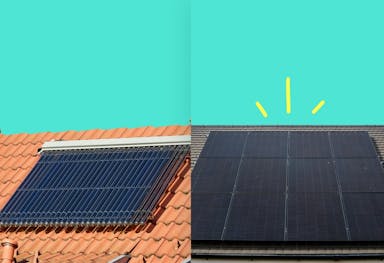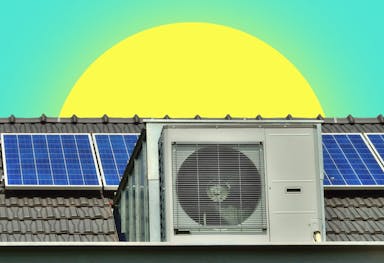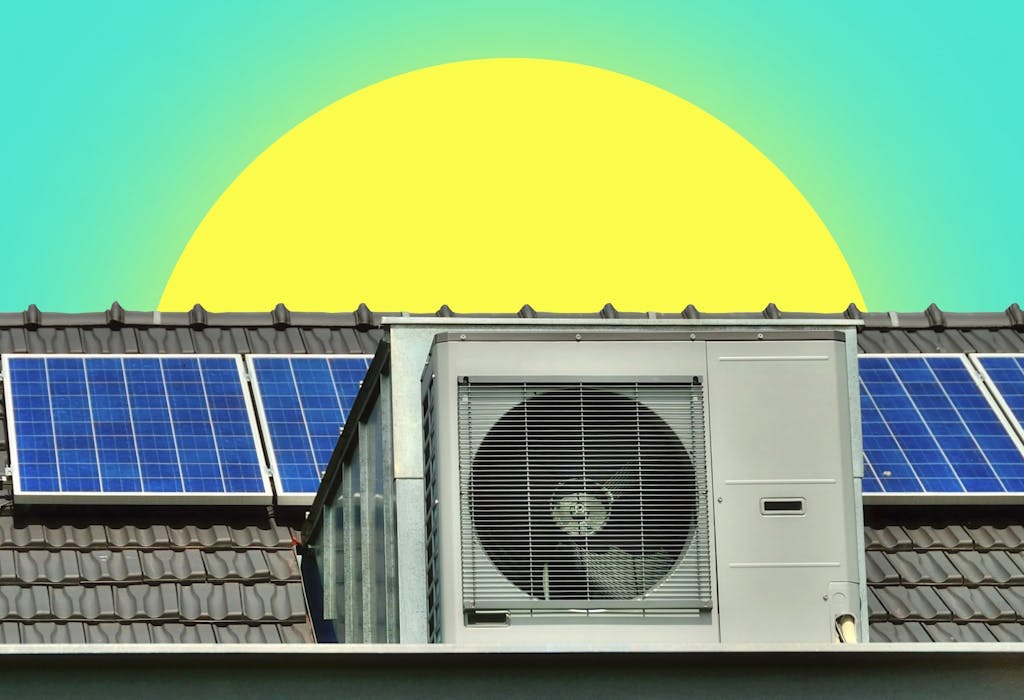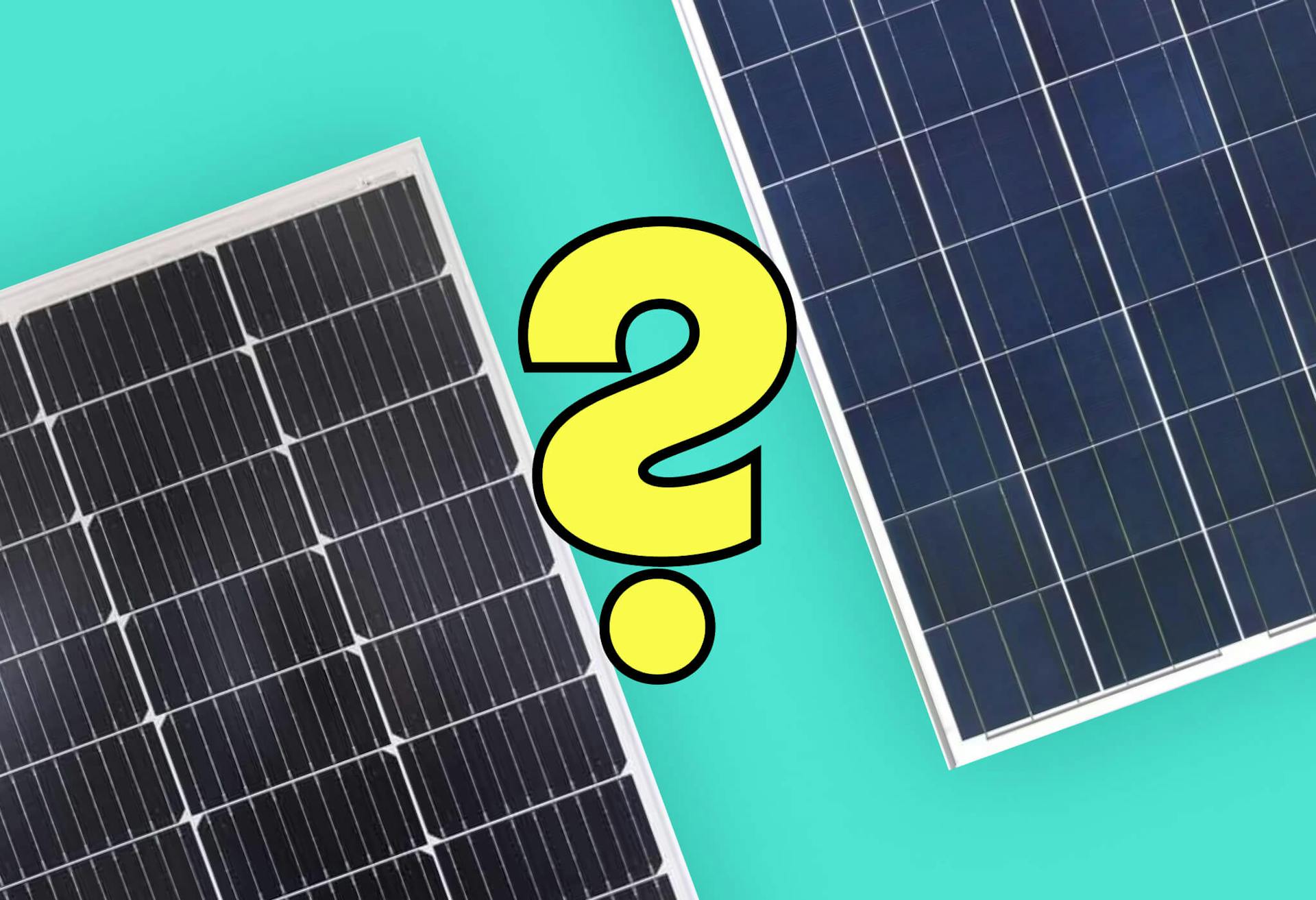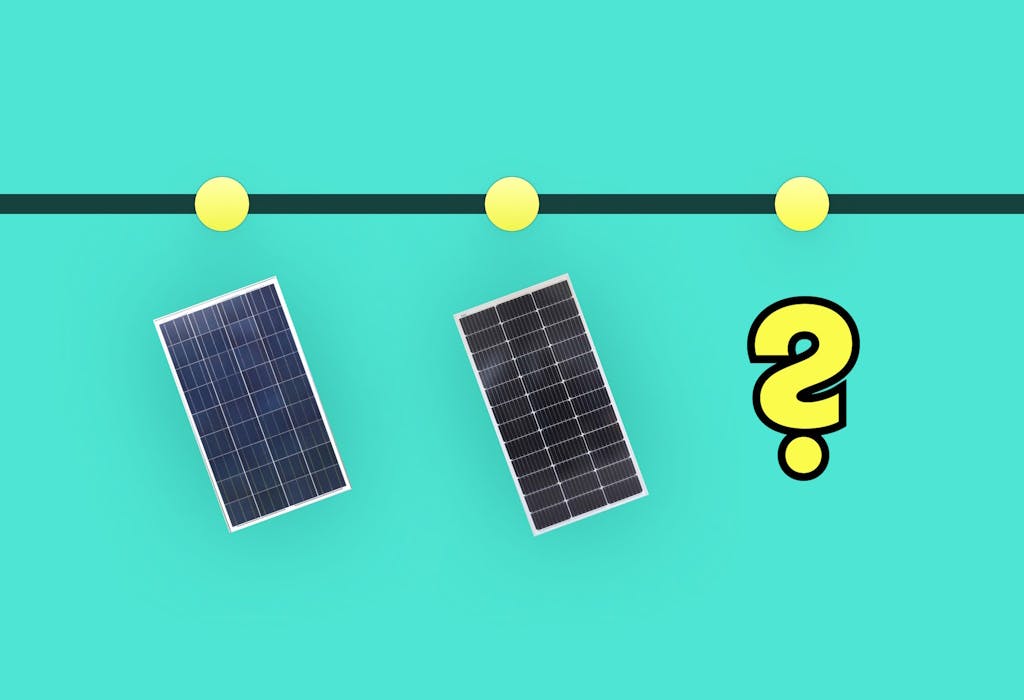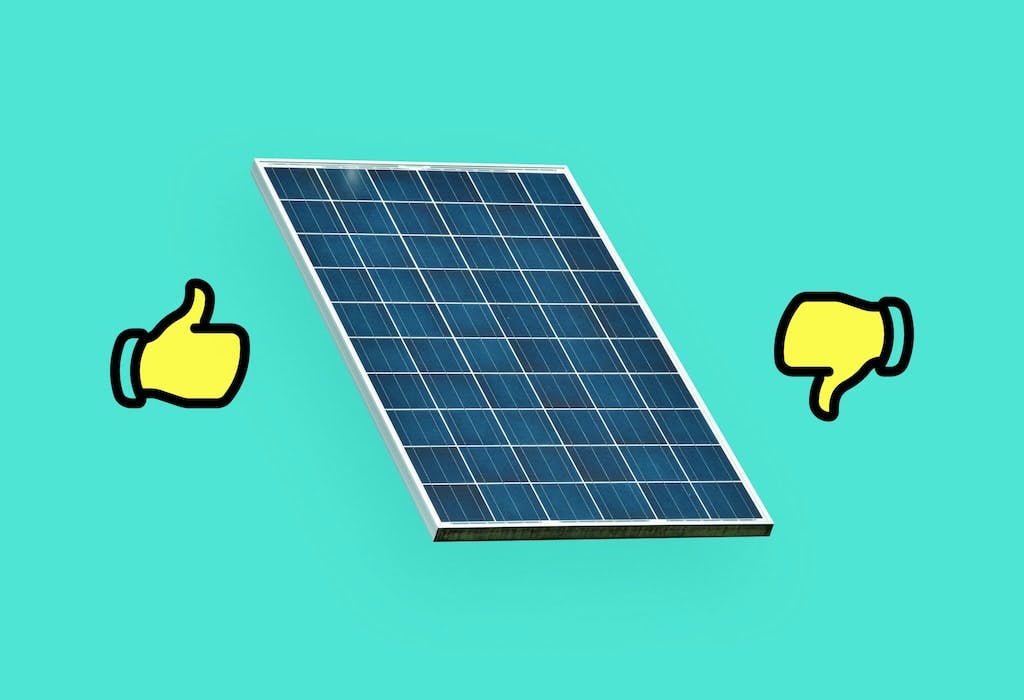- Solar advice hub
- Solar-technology
- Can solar panels heat a house in the UK?
Can solar panels heat a house in the UK?
Solar panels can heat a home in various ways. Here are their pros, their cons, and which methods are best for you.


Why you can trust our content
We know that the solar industry is full of misinformation, but we only use reliable sources, including:
- Our experienced solar experts, installers and system designers
- Our own database of solar & battery system designs
- Authoritative bodies like MCS and the UK government



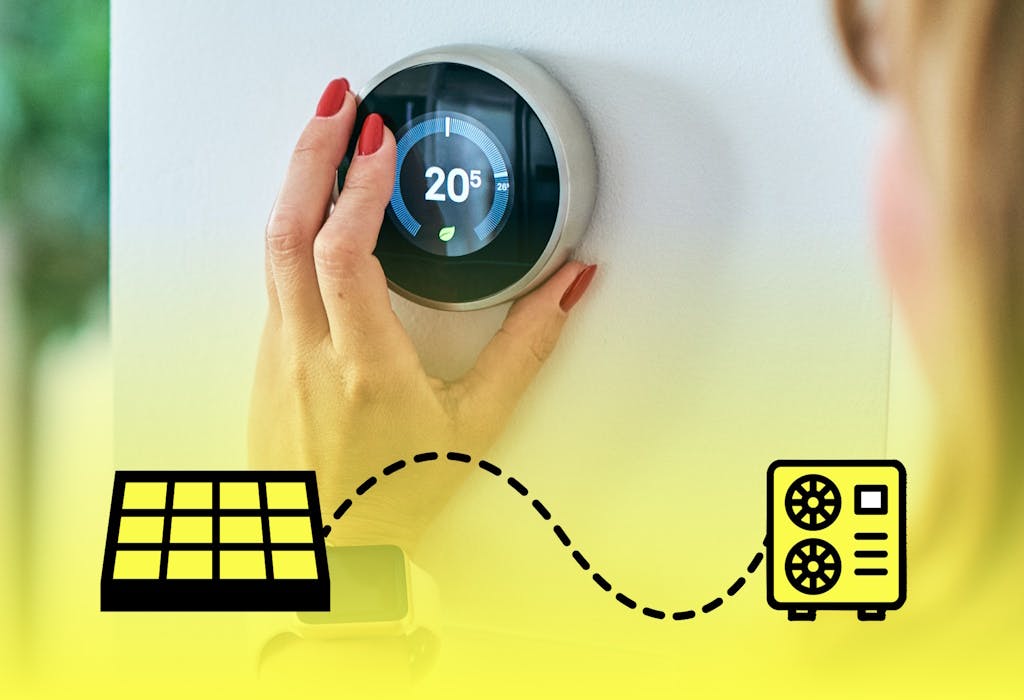
Calculate savings
What kind of home do you live in?
Calculate savings
What kind of home do you live in?
At a glance
Solar panels can massively reduce your electricity bills, but they can also help power your heating system.
When used alongside an electric boiler or heat pump, a solar panel system could save you hundreds of pounds per year, cut your carbon footprint, and add value to your home.
In this guide, we’ll explain the different ways in which you can use solar panels to heat a house, their pros and cons, and which methods make sense for different households.
To find out how much a solar & battery system could save you in the long run, answer a few quick questions below and we'll provide an estimate.
Find out how much you can save
What kind of home do you live in?
Is it possible to heat your house with solar panels?
It is possible to heat your home with solar panels, either directly with a solar thermal setup, or indirectly by powering a heating system that uses electricity.
By running this heat source on free solar electricity, you could cut your energy bills by hundreds of pounds.
You’ll probably still need to get some electricity from the grid in winter to power your heating, as solar output drops and your need for heating rises, but the potential savings would be substantial nevertheless, and you’d also be helping the climate.
Here are the main ways you can heat your house alongside solar panels, which we’ll go into more detail about below:
- Solar thermal panels
- A heat pump
- An electric boiler
- Infrared panels
- Electric space heaters
- A diverter
The average cost of heating a three-bedroom house with solar panels
1. Solar thermal panels
Solar thermal panels are fixed to your roof to provide your household with hot water, and typically cost around £6,000 for a three-bedroom household to buy and install, according to the Energy Saving Trust (EST).
They absorb the infrared part of sunlight, turn it into heat, and use that to raise the temperature of the liquid in the panels, which is generally a mix of water and glycol.
Solar thermal panels send this warmed-up fluid through the pipes and your hot water cylinder, heating up the cold water you get from the mains as it goes.
If you have a conventional or system boiler – or an immersion heater – then solar thermal panels can typically cut your heating bills by 50% , by using free solar energy to supply half of your hot water.
Pros and cons of solar thermal panels
| They cut your heating bills in half, typically | It takes 14 years to break even, on average* |
| The installation is usually pain-free | Their appearance isn’t universally popular |
| They’re low-maintenance | You’ll still need a boiler or immersion heater |
| They save a tonne of CO2 per year** | Combi boilers aren’t compatible |
* Based on the current price of gas
** Based on the EST’s assertion that solar thermal panels supply roughly half of your hot water, and Nesta’s finding that a gas boiler emits 2.2 tonnes of CO2 per year, on average
2. Solar panels with a heat pump
A heat pump draws warmth from the air, ground, or water and uses it to supply hot water to your home’s radiators, showers, and taps.
Air, ground, and water source heat pumps are all around four times more efficient than boilers, and they all run on electricity, which solar panels can supply.
A three-bedroom household will typically pay £14,000 for an air or water source heat pump , and either £28,000 or £57,000 for a ground source heat pump, depending on the nature of the installation.
Fortunately, the government’s Boiler Upgrade Scheme can reduce any of these price tags by £7,500.
Solar panels cost around £11,307 for a three-bedroom household, so if you choose to get an air source heat pump, you’ll pay about £17,807 overall.
Pros and cons of solar panels with a heat pump
| The Boiler Upgrade Scheme reduces the price tag by £7,500 | The upfront cost is still large |
| You can massively cut your carbon footprint | Heat pumps are less efficient during winter |
| You could slash your heating costs by around 80%* | You’d probably still need some grid electricity |
| Your home would be future-proofed against any future gas boiler ban |
* Based on Sunsave's calculations
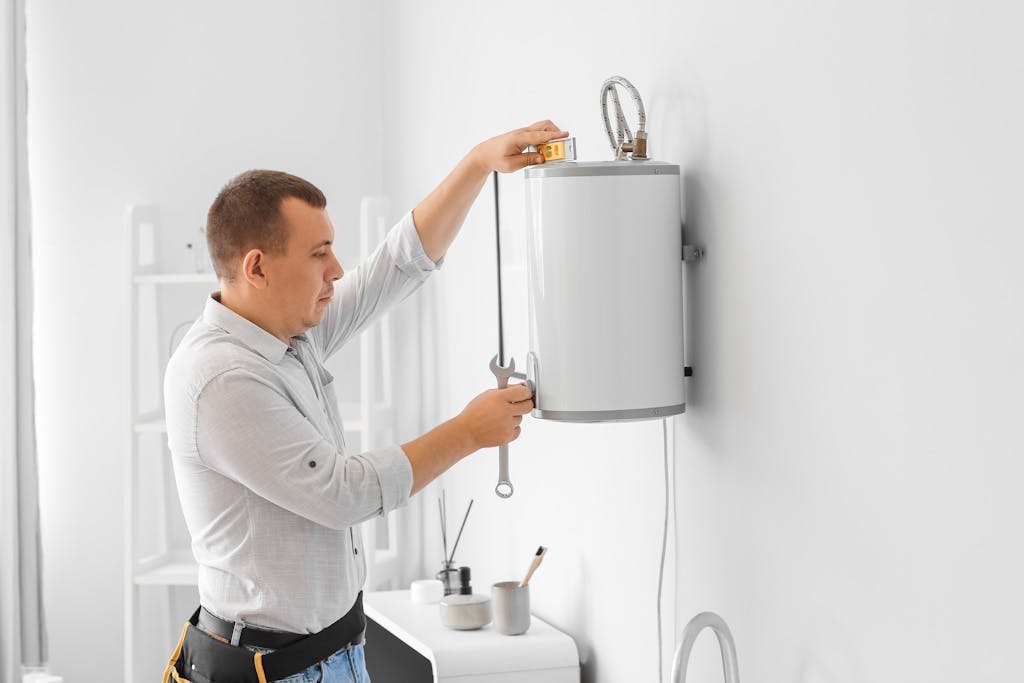
3. Solar panels with an electric boiler
Electric boilers work exactly like gas boilers, except they’re powered by electricity.
They cost roughly £4,000 for a three-bedroom house, plus around £11,307 for a solar panel system, meaning you'd be spending about £15,307 in total.
However, electric boilers are only slightly more efficient than their gas counterparts, which means you’d need a lot of electricity every year to power your heating – and electricity is four times as expensive as gas.
Solar panels can lessen that burden by providing you with plenty of free electricity.
Even a large solar panel system probably wouldn’t be able to completely power your electric boiler (e.g. due to seasonal variations in sunlight and the fact that solar panels don’t generate electricity at night), but a 3kWp system would still save you hundreds of pounds.
Depending on your system, you might never break even – but you wouldn’t break even with a gas boiler either.
Pros and cons of solar panels with an electric boiler
| You can save hundreds of pounds per year | You may never break even |
| It can massively cut your carbon footprint | They’re four times less efficient than heat pumps |
| An electric boiler can go anywhere in your home, as there’s no flue | They’re usually unsuitable for large homes |
| You don’t always need a hot water tank | The standard warranty is 2-5 years |
If you’re interested in how much you could save with a solar & battery system, just answer a few quick questions below and we'll generate an estimate for you.
Find out how much you can save
What kind of home do you live in?
4. Solar panels with infrared panels
Solar panels can also heat your home by supplying electricity to infrared panels, which heat you directly instead of the air around you.
These large, ingenious panels can be fixed to your ceilings or walls, where they emit infrared radiation that travels through your room until it comes into contact with an object or person.
When it hits you, it’ll sink about an inch below your skin, warming you up in the same way the sun does – which is completely safe, even if it sounds unnerving.
It typically costs around £6,000 to buy enough infrared panels for a three-bedroom house, according to Herschel Infrared, which goes up to £17,307 when you add solar panels.
It’s possible to install infrared wall panels yourself, simply by hanging them up and plugging them into a socket.
With a top efficiency of 115%, infrared panels also need less energy than gas boilers and electric boilers, and it’s simple to turn off panels when you leave a room, all of which should result in lower heating bills – but they can’t provide you with hot water.
Pros and cons of solar panels with infrared panels
| You can set up infrared panels yourself | They don’t supply hot water |
| They’re more efficient than boilers | They’re more expensive than boilers |
| They heat humans and objects, not air | Obstructions reduce their effectiveness |
| You can turn them off when you leave a room |
5. Solar panels with electric space heaters
Electric space heaters take electricity and turn it into warmth, either by using a heating element or infrared technology.
As well as the popular fan heater, this category also includes ceramic, infrared, and oil-filled heaters, all of which can be purchased for around £100, according to our research.
You can use these machines to quickly warm up an area, but you shouldn’t rely on them to heat your whole house.
Doing so in a three-bedroom household would cost at least £1,200, wouldn’t supply you with hot water, and realistically wouldn’t keep you warm unless you barely move around.
They’re best used as a relatively cheap, quick fix for cold spots, especially as they’re usually relatively energy inefficient. Solar panels can help soften this blow, but they can also power more efficient, whole-house solutions.
You’ll typically pay £11,307 for a solar panel system, so your overall cost would be £12,507 for a heating method that’s less than ideal.
Pros and cons of solar panels with electric space heaters
| It’s a cheap, quick fix for a cold spot | You can’t effectively heat a whole house |
| The heaters are portable | It’s energy inefficient |
| It doesn’t supply hot water |
6. Solar panels with a diverter
A solar power diverter allows you to send the excess solar electricity your panels generate to power certain appliances in your home, instead of being automatically funnelled off to the grid.
You can use this extra electricity to partly power your immersion heater, which helps keep your hot water tank at the right temperature – thus cutting your heating costs.
A diverter usually costs between £250 and £500 for a three-bedroom household, according to our research, though you’ll also need to pay an engineer around £100 to install it. Solar panels cost £11,307 on average, so you’ll typically pay a total of £11,782.
This involves fitting a small box near your hot water tank, wiring it in, and installing two clamps – one on the solar panels’ AC cable, and one on your mains import cable.
The diverter will then track your home’s electricity consumption and the solar panels’ production levels, and redirect any excess solar electricity to the immersion heater.
With an electric heating system, this can save you around £100-£200 per year, according to our calculations.
However, if you use gas, you’re better off sending your solar energy to the grid with one of the best smart export tariffs instead, as you can make at least twice as much money that way.
Pros and cons of solar panels with a diverter
| You can use more of your solar electricity | It only makes financial sense if added to an electric heating system |
| It reduces your carbon footprint | Diverting instead of exporting won’t necessarily reduce the UK’s emissions |
| A diverter is relatively cheap |
Summary
As you can see, there are several ways you can use solar panels to heat a house.
That means you can use this free source of electricity for more than keeping the lights on – you can use it to provide warmth and comfort, too.
The only issue with using solar panels to heat your home is most of their output happens during summer, when properties generally don’t need much heating.
To help combat this fact, you can add a solar battery, which allows you to make hay while the sun shines, and save the excess for a rainy day – or nighttime.
If you’re wondering how much a solar & battery system could save you, just answer a few quick questions below and we'll provide an estimate for you.
Find out how much you can save
What kind of home do you live in?
FAQs
Related articles

Written byJosh Jackman
Josh has written about the rapid rise of home solar for the past six years. His data-driven work has been featured in United Nations and World Health Organisation documents, as well as publications including The Eco Experts, Financial Times, The Independent, The Telegraph, The Times, and The Sun. Josh has also been interviewed as a renewables expert on BBC One’s Rip-Off Britain, ITV1’s Tonight show, and BBC Radio 4 and 5.
